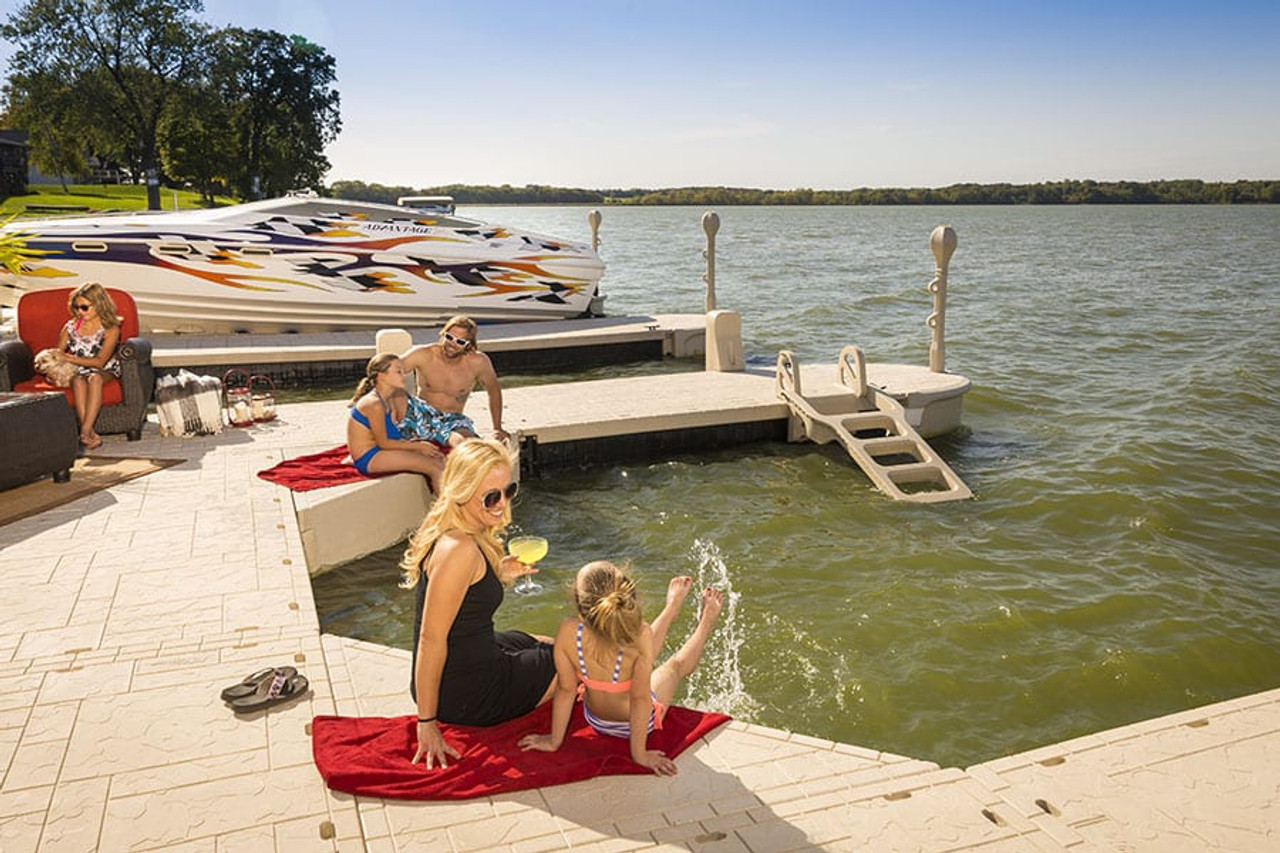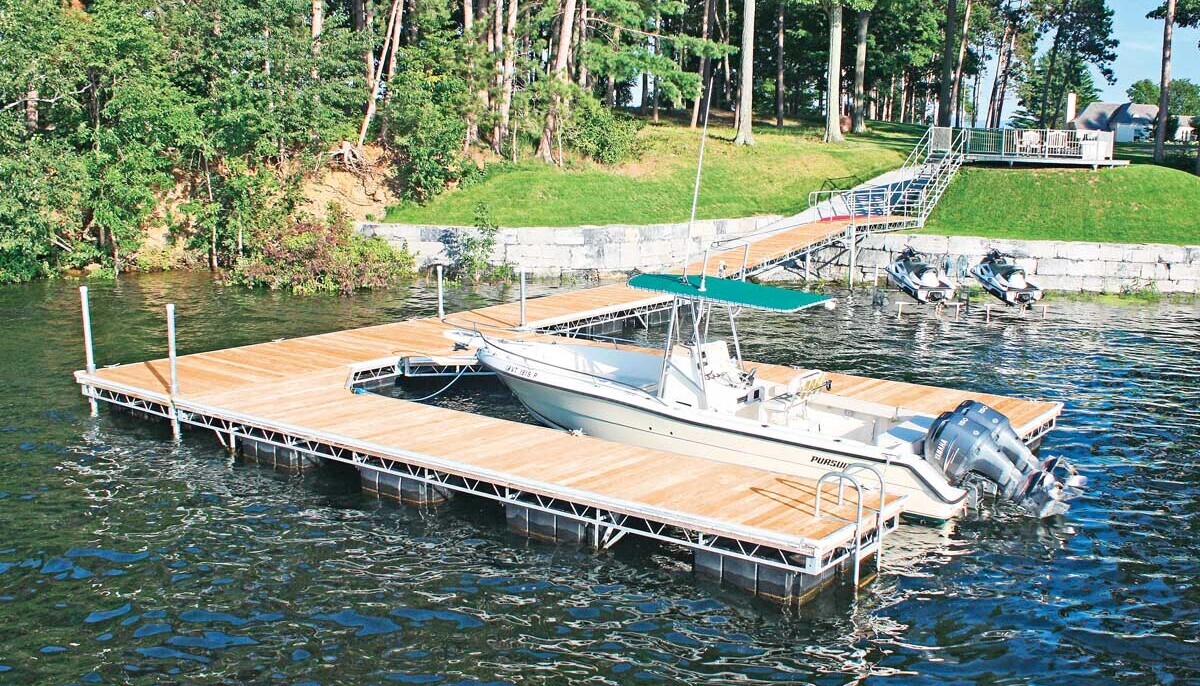Floating Docks: The Smart Option for Modern Waterfront Living and Recreation
Floating Docks: The Smart Option for Modern Waterfront Living and Recreation
Blog Article
Floating Docks: The Suitable Option for Versatile Water Accessibility
Floating docks present an engaging service for a range of water gain access to needs, providing flexibility that transcends typical mooring options. Their ability to adjust to ever-changing water levels while guaranteeing stability and security makes them particularly beneficial for both industrial and entertainment applications. In addition, the modular nature of floating docks facilitates customization, accommodating details demands. Nonetheless, the nuances of installation and maintenance, together with the variety of applications, warrant a closer assessment to completely value their prospective advantages and ramifications for waterway access techniques.
Advantages of Floating Docks
Floating docks deal numerous benefits that boost water accessibility for different applications. Their ability to climb and fall with transforming water levels makes them specifically helpful in environments with fluctuating trends or seasonal variations. This flexibility makes sure that vessels can easily tie without issue for the water's deepness, offering a reliable system for entertainment, business, and commercial usages.
Furthermore, floating docks are frequently built from long lasting products that stand up to rust, making them suitable for long-term use in aquatic environments. Their installation is typically less intrusive than traditional fixed docks, reducing the environmental effect and promoting quicker implementation (dock company). This versatility enables for less complicated relocation or reconfiguration according to customer requirements or environmental changes
Safety and security is another key advantage; floating docks can give stable access for individuals getting off or boarding from boats and reduce the risk of accidents connected with unsteady surfaces. Additionally, they can be developed to accommodate a variety of accessories, such as cleats and fenders, improving performance. Generally, floating docks represent an effective remedy for boosting water accessibility across diverse fields while advertising security and environmental sustainability.

Kinds of Floating Docks
Different sorts of floating docks accommodate different requirements and environments, each developed with details functions to enhance functionality. The most usual types include modular docks, which contain interlacing sections that enable easy personalization and development. These docks are suitable for entertainment use, as they can be customized to fit various boat dimensions and water problems.
Another popular choice is the fixed floating dock, which remains anchored in position yet drifts with changing water levels. floating dock builder. This kind is particularly matched for locations with very little tidal variations, giving secure gain access to for angling or swimming. Additionally, there are drive-on docks, which include a sloped style that enables boats to conveniently drive on and off, making them appropriate for personal watercraft and smaller vessels
For industrial applications, durable floating docks are available, constructed from reinforced materials to hold up against considerable tons and rough aquatic settings. Eco-friendly floating docks use sustainable materials and designs to decrease ecological effect, commonly integrating attributes like plant life to sustain regional wildlife. Understanding the numerous kinds of floating docks makes certain that customers can choose the most ideal option for their certain requirements.
Installment Process Overview
An effective setup of floating docks requires mindful planning and focus to information to guarantee optimal performance and safety and security. The preliminary action involves evaluating the site conditions, consisting of water deepness, existing, and potential challenges. This analysis educates the choice of the appropriate dock products and design customized to the certain environment.
Following, obtaining needed permits is critical, as lots of territories have policies regarding building on water bodies. The setup can proceed when approvals are protected. Begin by preparing the structure, which might involve anchoring systems or pilings tailored to the dock type and local problems.
Complying with the structure setup, set up the dock areas according to manufacturer specs. Make certain that all components are safely attached and straightened to endure environmental stress and anxieties. Placement the dock in the designated area, guaranteeing it is degree and secure.

Upkeep Tips and Finest Practices
After the installation process is complete, ongoing maintenance plays a vital duty in making certain the long life and performance of floating docks. Normal evaluations ought to be conducted to recognize any kind of indications of wear, damage, or deterioration - floating dock company. Check for any kind of loose fittings, cracks, or splitting up in the dock areas, as these can endanger architectural honesty
Cleaning up the dock is important to get rid of particles, algae, and other build-up that can influence its appearance and security. Utilize a mild stress wash regularly to maintain tidiness without creating damages to the surface area. In addition, using a protective sealant every few years can help boost longevity and stand up to environmental wear.
Take notice of the mooring lines and supports, guaranteeing they are safe and secure and complimentary from deterioration. Replace any type of degraded components immediately to avoid dangers. Seasonal adjustments may additionally be necessary; during severe weather condition conditions, repositioning or strengthening the dock can stop damages.
Applications for Floating Docks
Floating docks serve a wide range of applications, dealing with both industrial and leisure demands. In recreational setups, they offer seamless accessibility to rivers for tasks such as boating, angling, and swimming. Their adjustable nature permits setup in varying water degrees, guaranteeing steady and secure accessibility no matter tidal fluctuations.
Readily, floating docks are essential for marinas and waterside services. They assist in the docking of vessels, making it possible for reliable discharging and packing of products. Their modular style permits very easy growth or reconfiguration to fit altering organization needs, making them ideal for boat rentals, tour procedures, or angling charters.
In addition, floating docks are utilized in environmental applications such as marine study and imp source environment repair. They can act as platforms for scientific research studies, checking water top quality, or carrying out wildlife surveys without troubling delicate environments.
In industrial contexts, floating docks are employed in building projects, supplying accessibility to hard-to-reach areas for tools and personnel. Their versatility, sturdiness, and minimal effect on the atmosphere make them an optimum option for a vast array of applications, improving both capability and availability in various water-based settings.
Conclusion
Finally, floating docks represent an optimal service for diverse water gain access to requires, owing to their adaptability, resilience, and modular layout. These frameworks help with secure mooring for different applications while lessening environmental effect Visit This Link throughout installment. The reduced upkeep requirements even more improve their usefulness. Therefore, floating docks act as an important asset for entertainment, commercial, and ecological tasks, guaranteeing reliable accessibility to waterways and promoting sustainable methods in aquatic atmospheres.
Floating docks existing an engaging remedy for a selection of water accessibility requires, supplying convenience that goes beyond typical mooring options.Floating docks deal countless benefits that improve water accessibility for numerous applications. On the whole, floating docks represent a reliable service for improving water accessibility throughout varied fields while advertising security and environmental sustainability.
One more popular option is the fixed floating dock, which stays anchored in place yet drifts with altering water levels.In conclusion, floating docks represent an optimum remedy for varied water gain access to article source needs, owing to their flexibility, longevity, and modular style.
Report this page